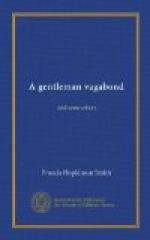Jack did not, but the owners of several names on the passenger-list did, and hitched their camp-stools closer.
“Well, Kent was the only man I ever knew who ever held out against the damnable oligarchy.”
Here an old fellow in a butternut suit, with a half-moon of white whiskers tied under his chin, leaned forward in rapt attention.
The major braced himself, and continued: “Kent, gentlemen, as many of you know, lived with his maiden sister over on Tinker Neck, on the same piece of ground where he was bo’n. She had a life interest in the house and property, and it was so nominated in the bond. Well, when it got down to hog and hominy, and very little of that, she told Kent she was goin’ to let the place to a strawberry-planter from Philadelphia, and go to Baltimo’ to teach school. She was sorry to break up the home, but there was nothin’ else to do. Well, it hurt Kent to think she had to leave home and work for her living, for he was a very tender-hearted man.
“‘You don’t say so, Jane,’ said he, ’and you raised here! Isn’t that very sudden?’ She told him it was, and asked him what he was going to do for a home when the place was rented?
“‘Me, Jane? I shan’t do anythin’. I shall stay here. If your money affairs are so badly mixed up that you’re obliged to leave yo’ home, I am very deeply grieved, but I am powerless to help. I am not responsible for the way this war ended. I was born here, and here I am going to stay.” And he did. Nothing could move him. She finally had to rent him with the house,—he to have three meals a day, and a room over the kitchen.
“For two years after that Kent was so disgusted with life, and the turn of events, that he used to lie out on a rawhide, under a big sycamore tree in front of the po’ch, and get a farm nigger to pull him round into the shade by the tail of the hide, till the grass was wore as bare as yo’ hand. Then he got a bias-cut rockin’-chair, and rocked himself round.
“The strawberry man said, of co’se, that he was too lazy to live. But I look deeper than that. To me, gentlemen, it was a crushin’, silent protest against the money power of our times. And it never broke his spirit, neither. Why, when the census man came down a year befo’ the colonel’s death, he found him sittin’ in his rockin’-chair, bare-headed. Without havin’ the decency to take off his own hat, or even ask Kent’s permission to speak to him, the census man began askin’ questions,—all kinds, as those damnable fellows do. Colonel Kent let him ramble on for a while, then he brought him up standin’.
“‘Who did you say you were, suh?’
“‘The United States census-taker.’
“‘Ah, a message from the enemy. Take a seat on the grass.’
“‘It’s only a matter of form,’ said the man.
“‘So I presume, and very bad form, suh,’ looking at the hat still on the man’s head. ‘But go on.’
“‘Well, what’s yo’ business?’ asked the agent, taking out his book and pencil.




